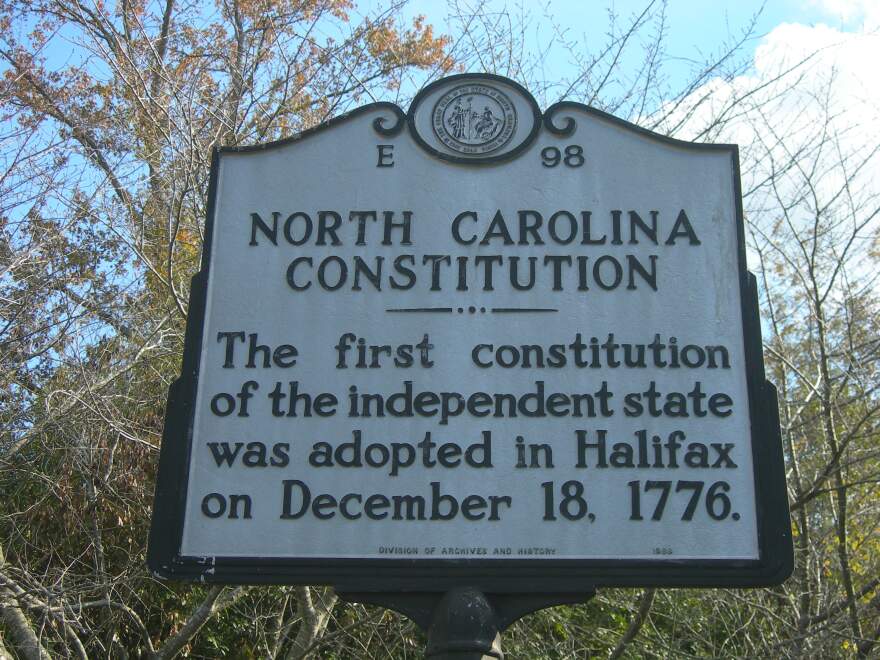On Friday, a Wake County Superior Court Judge ruled two of North Carolina’s recent constitutional amendments - lowering the cap on the income tax rate, and requiring a photo ID to vote – are unconstitutional. Judge G. Bryan Collins ruled they are invalid because a gerrymandered state legislature placed them on the November ballot, where they won easily.

The ruling was a surprise statewide and raises a number of questions. Kym Hunter of the Southern Environmental Law Center argued the case on behalf of the NAACP of North Carolina, and she joins us now to talk about what happened.
LISA WORF: So walk us through this. The two amendments were approved by large margins of voters with more than 55 percent of voters supporting photo ID and 57 percent approving the tax cap. So with so many North Carolinians supporting it how does that make it unconstitutional?
KYM HUNTER: Well, our constitution has a two-step process for constitutional amendments. And what the judge was looking at here was the first half of that process which requires a three-step majority in both the House and the Senate before the amendment can even be placed on the ballot. And what we argued and what the judge ruled was because our legislature was so racially gerrymandered, it did not represent the people of North Carolina. And so those three-fifths in the House and the Senate were not representative. And that made the amendment unconstitutional.
WORF: This was a surprising ruling. Were you yourself in fact surprised that you won? Was it an unusual argument?
HUNTER: It's certainly an argument that hasn't had to be made before and that's because we are just living in a really extraordinary time. The federal courts have already stressed just how unusual this is to be this gerrymandered of a state. And so it was a very extreme thing that our legislature did to stay in power, not representing the people of North Carolina for so long. And then to take the extraordinary step of amending the constitution it was extreme and unusual and so it called for a different legal approach.
WORF: Immediately after this ruling, Republicans were critical of the judge's reasoning. They asked whether the state budget is invalid because Gov. Roy Cooper vetoed it and the legislature used its three-fifths supermajority to override it. Is that a fair comparison?
HUNTER: Well the judge's ruling and the case that we put before the court is very strictly tied to constitutional amendments. There's a part of our constitution which talks about the fact that it cannot be amended without the will of the people. And so that's the case that we made and we're really focused on constitutional amendments and didn't make a larger argument about the state budget or anything else.
WORF: But carrying out this argument that if it was the super majority and if it was gerrymandering in this regard pushing that through. Does that argument not apply to other decisions the legislature has made?
HUNTER: Well, a key part of the judge's ruling comes right at the end, and what he said was invalidating these two constitutional amendments would not cause chaos and confusion. And that was a part of what we argued and a part of why he was comfortable making this ruling. And so to extend the ruling, you would also have to not cause chaos and confusion. It's really about balancing the importance of our democracy and the importance of all of our voices being heard with the importance of the regular order of government. So those arguments that were being thrown around on Friday night really don't have any merit to them.
WORF: I understand the ruling now is that the amendment is unconstitutional, but the legislature has also passed an implementation law as far as photo ID that says what kind of ID can be used to vote. So as of now do we have photo ID in North Carolina?
HUNTER: Well, that implementing legislation is being challenged in federal and state court. I'm not an attorney and in either of those cases so I can't really speak to that. But I imagine there will be a lot of questions which will need to be answered in the coming weeks.
WORF: Assuming the Republican leadership appeals, what's next for this case?
HUNTER: Well I think we'll have to see if the ball is really in their court. I wouldn't be surprised if this ends up in the Supreme Court, one way or the other.
WORF: Which has a Democratic majority right now. Is there any other avenue than that that could be taken?
HUNTER: Other than this the state Supreme Court. No this is a question of state law - an unsettled question of state law, at least that was settled until Friday, and the Federal Court already made that very clear. So this, certainly the state Supreme Court would have the final word on this.





